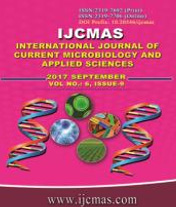


 National Academy of Agricultural Sciences (NAAS)
National Academy of Agricultural Sciences (NAAS)

|
PRINT ISSN : 2319-7692
Online ISSN : 2319-7706 Issues : 12 per year Publisher : Excellent Publishers Email : editorijcmas@gmail.com / submit@ijcmas.com Editor-in-chief: Dr.M.Prakash Index Copernicus ICV 2018: 95.39 NAAS RATING 2020: 5.38 |
Polymorphism is found in almost all livestock animals including poultry and occurs at all levels of genetic organization from DNA sequence to major morphological traits in livestock animals. Genetic polymorphism contributes to the phenotype variability in animals and is an essential component of genetic improvement of the livestock animals. The genetic variations in livestock animals for meat production create a great interest to the researchers and had been used by them in Marker Assisted Selection (MAS) to identify animals with specific beneficial production traits and there after selecting mating pairs based on these traits. The polymorphism in animals at gene level may arise due to changes in nucleotides. The goal of polymorphism at the gene level is to locate and precisely describe changes in DNA sequences that are responsible for variation among the different phenotypes. Myostatin (MSTN/GDF8) is a member of transforming growth factor-β super family. It is produced by skeletal muscle and acts as a negative regulator of muscle growth. It has an essential role in the regulation of muscle growth and meat quality. As a result, MSTN gene is primarily responsible for muscle growth and development and could be a potential candidate gene marker for animal muscular growth.
 |
 |
 |
 |
 |